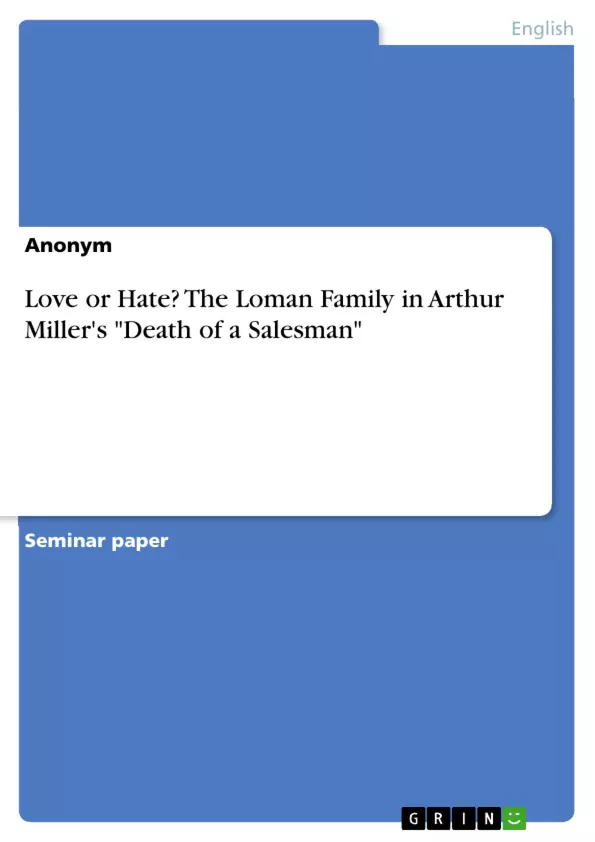This paper deals with the familiar circumstances of the Loman family in Arthur Miller's play “Death of a Salesman”. Right from the beginning, the reader is confronted with a see-saw of love and hate between the family members. The aim of this paper is to make it easier to understand the characters and their behaviour as well as to analyse the relationships between them.
The distinctive humanity of the characters supports the reader's opportunity of putting himself or herself in the position of these characters. Finally, the result will show that there is more love than hate and that most of the hate is the hate that the characters have for themselves.
Table of Contents
- Introduction
- The Loman Family - Love or Hate?
- Introducing the most important characters
- Willy Loman
- Linda Loman
- Biff Loman
- Happy Loman
- Uncle Ben
- Charley and Bernard
- Analysis
- Introducing the most important characters
- Conclusion
Objectives and Key Themes
This paper aims to analyze the complex relationships within the Loman family in Arthur Miller's "Death of a Salesman," exploring the interplay of love and hate among its members. It seeks to provide a deeper understanding of the characters' behaviors and motivations, enhancing reader comprehension and empathy.
- The complexities of familial relationships marked by both love and resentment.
- The impact of the American Dream's unattainability on individual lives and family dynamics.
- The role of self-hate and internal conflicts in shaping interpersonal relationships.
- The consequences of poor communication and its effect on family unity.
- The exploration of different coping mechanisms in response to life's challenges and failures.
Chapter Summaries
Introduction: This introductory chapter sets the stage for the analysis of the Loman family in Arthur Miller's "Death of a Salesman." It highlights the fluctuating dynamic of love and hate within the family and previews the paper's objective: to analyze the characters' behaviors and relationships. The introduction emphasizes the human element of the characters, enabling readers to connect with their struggles, and suggests that the prevalent emotion within the family is ultimately love, often masked by self-directed animosity.
The Loman Family - Love or Hate?: This chapter delves into the emotional volatility of the Loman family, characterized by frequent shifts between joy and sorrow, particularly within Willy Loman's unpredictable moods. The text suggests a foundation of love, but this is significantly hampered by self-hate and communication issues, resulting in a dysfunctional family dynamic. The chapter establishes the need to analyze individual characters before comprehensively understanding their intertwined relationships, thus setting the groundwork for the character analyses in subsequent sections.
Introducing the most important characters: This section provides individual profiles of the key members of the Loman family, offering detailed insight into their personalities, motivations, and relationships. While the summaries explore each character individually, they foreshadow the overarching theme of the interplay between love and hate within the family. Each character portrait highlights their individual struggles, ultimately connecting to the overarching family dynamic.
Keywords
Death of a Salesman, Arthur Miller, family relationships, love, hate, American Dream, self-hate, communication, dysfunctional family, Willy Loman, Linda Loman, Biff Loman, Happy Loman, psychological analysis, character analysis.
Death of a Salesman: A Comprehensive Language Preview - FAQ
What is this document?
This document is a comprehensive language preview for an academic analysis of Arthur Miller's "Death of a Salesman." It provides a structured overview including the table of contents, objectives and key themes, chapter summaries, and keywords.
What topics are covered in the analysis?
The analysis focuses on the complex relationships within the Loman family, exploring the interplay of love and hate among its members. Key themes include the complexities of familial relationships, the unattainability of the American Dream, self-hate, poor communication, and coping mechanisms in response to life's challenges.
What is the objective of the analysis?
The paper aims to analyze the complex relationships within the Loman family, exploring the interplay of love and hate among its members. It seeks to provide a deeper understanding of the characters' behaviors and motivations, enhancing reader comprehension and empathy.
What is included in the Table of Contents?
The table of contents includes an introduction, a chapter dedicated to analyzing the Loman family's relationships (including individual character analyses of Willy, Linda, Biff, Happy, Uncle Ben, Charley, and Bernard), and a conclusion.
What are the chapter summaries?
The introduction sets the stage for the analysis, highlighting the fluctuating dynamic of love and hate within the family. The main chapter delves into the emotional volatility of the Loman family, emphasizing a foundation of love hampered by self-hate and communication issues. A section dedicated to individual character profiles provides detailed insights into their personalities, motivations, and relationships, foreshadowing the interplay between love and hate.
Which characters are analyzed?
The analysis focuses on the key members of the Loman family: Willy Loman, Linda Loman, Biff Loman, Happy Loman, Uncle Ben, Charley, and Bernard. Each character's individual struggles and their contributions to the overall family dynamic are explored.
What are the key themes explored in the analysis?
Key themes include: the complexities of familial relationships marked by both love and resentment; the impact of the American Dream's unattainability; the role of self-hate and internal conflicts; the consequences of poor communication; and the exploration of different coping mechanisms.
What are the keywords associated with this analysis?
Keywords include: Death of a Salesman, Arthur Miller, family relationships, love, hate, American Dream, self-hate, communication, dysfunctional family, Willy Loman, Linda Loman, Biff Loman, Happy Loman, psychological analysis, character analysis.
What is the intended audience for this analysis?
The intended audience is academic, focusing on structured analysis of themes in Arthur Miller's "Death of a Salesman".
- Arbeit zitieren
- Anonym (Autor:in), 2008, Love or Hate? The Loman Family in Arthur Miller's "Death of a Salesman", München, GRIN Verlag, https://www.grin.com/document/414332



